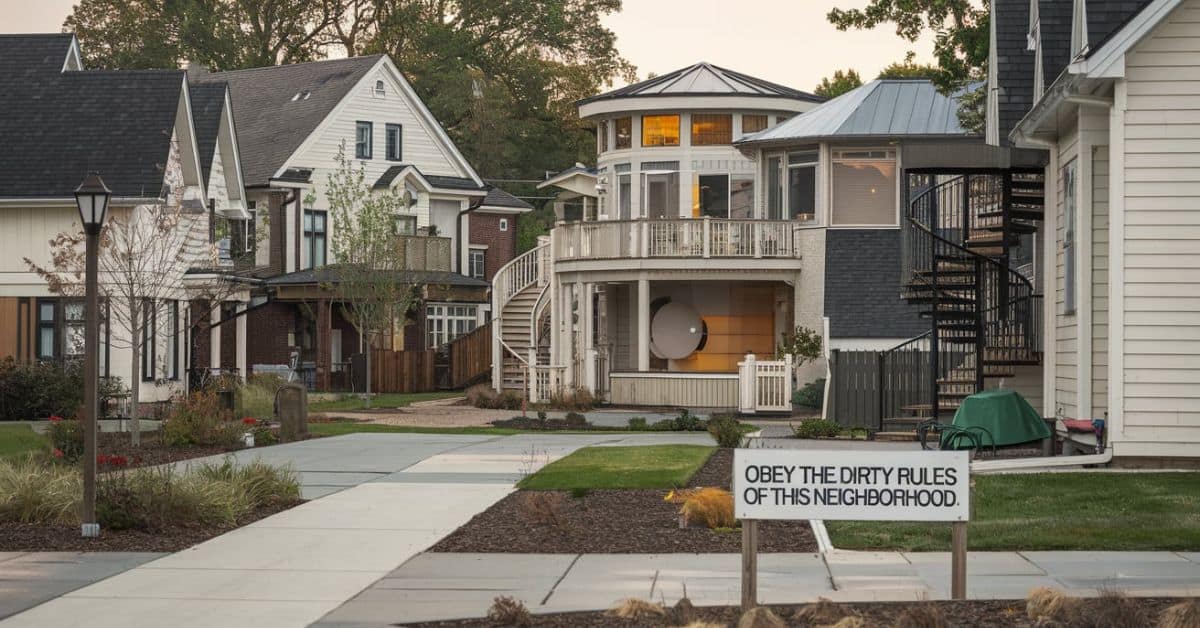Obey the Dirty Rules of This Neighborhood: A Comprehensive Guide
In every neighborhood, there are unspoken rules that shape the way people interact with one another. Sometimes these rules are straightforward, while other times, they take on a more peculiar twist. This article dives deep into the concept of “obey the dirty rules of this neighborhood,” exploring the quirky, humorous, and sometimes outrageous norms that can govern social behavior. By understanding these rules, residents can better navigate their community, avoid misunderstandings, and even foster closer connections with their neighbors.
Every community has its unique culture, influenced by the people who live there, their histories, and their collective values. These dynamics can often lead to the formation of unofficial “rules” that residents are expected to follow. Understanding these dynamics can help newcomers integrate more smoothly into the community, while long-time residents can gain insight into the evolving nature of their neighborhood.
What Are the “Dirty Rules”?
The phrase “dirty rules” refers to unconventional, often humorous, social expectations that may not be formally acknowledged but are widely understood within a community. These can range from dress codes to acceptable behaviors in public spaces. While some may find these rules odd, they often serve to reinforce social cohesion and a sense of belonging among residents.
Why Do We Follow These Rules?
Following neighborhood rules, even the quirky ones, can foster a sense of belonging and community spirit. Engaging with these norms helps build relationships, reduces friction among neighbors, and often provides a shared source of humor or entertainment. The key is to understand and navigate these rules effectively, which can vary widely from one neighborhood to another.
The Origins of the “Dirty Rules”
Understanding where these rules come from can help in grasping their significance. Many of these rules have historical roots, stemming from the culture, demographics, and even the geographical layout of a neighborhood.
Historical Context
In many cases, the history of a neighborhood plays a crucial role in the development of its rules. For example, communities with a long-standing tradition of close-knit relationships may develop unique customs that newcomers find puzzling. These customs can reflect historical events, migration patterns, or the influence of specific cultural groups.
Cultural Influences
Cultural backgrounds heavily influence how rules are created and maintained within a neighborhood. For instance, some communities may have more liberal attitudes toward personal expression, leading to more unconventional “dirty rules.” Other areas may uphold more conservative standards, resulting in stricter adherence to traditional norms.
Examples of “Dirty Rules” in Neighborhoods
Understanding the common “dirty rules” in a neighborhood can help newcomers adapt quickly and avoid potential faux pas. Here are some notable examples:
1. Dress Codes for Trash Disposal
One of the most humorous and shocking “dirty rules” may involve dress codes for taking out the trash. In some neighborhoods, it is said that residents—especially women—should not wear underwear or bras when taking out the trash. This peculiar rule often stems from a mix of humor and an exaggerated sense of casualness, representing a laid-back attitude toward community living.
2. Pet Policies
Another common rule is related to pet ownership. Some neighborhoods impose unusual regulations regarding how pets are walked or what they wear. For instance, certain areas may require dogs to wear specific attire or even costumes during community events. While these rules may seem trivial, they can enhance community engagement and provide a shared experience among residents.
3. Shared Spaces Etiquette
Communal areas like parks and playgrounds often come with their own set of “dirty rules.” For example, in some neighborhoods, residents are expected to bring snacks or drinks to share during casual meetups in parks. This expectation, while not officially documented, creates a welcoming atmosphere and encourages socializing among neighbors.
4. Quiet Hours and Noise Levels
Every neighborhood has its quiet hours, but some take this a step further with humorous expectations. In one neighborhood, it might be considered rude to make loud noises during designated quiet hours—unless it’s a special occasion like a neighborhood block party. These rules help maintain a peaceful living environment while allowing for the occasional celebration.
Navigating the “Dirty Rules”
Understanding how to navigate these rules is crucial for residents who want to thrive in their neighborhoods. Here are some tips for adapting to these quirky norms:
1. Observe and Learn
The best way to grasp the “dirty rules” is through observation. Pay attention to how neighbors interact and what behaviors are accepted or frowned upon. This will help you gauge the community culture and adapt accordingly.
2. Ask Questions
Don’t hesitate to ask long-time residents about the neighborhood’s unwritten rules. Most people appreciate when newcomers show interest in their customs and will be happy to share their insights.
3. Participate in Community Events
Engaging in local events is a great way to immerse yourself in the neighborhood culture. Whether it’s a potluck, block party, or clean-up day, participating helps you connect with others while also giving you firsthand experience of the neighborhood norms.
Analyzing the Impact of “Dirty Rules” on Community Cohesion
The “dirty rules” of a neighborhood can significantly impact social dynamics and cohesion. Here’s how:
1. Building Relationships
When residents engage with these rules, it often leads to the formation of friendships and stronger community ties. Shared experiences—whether they are humorous or odd—create lasting memories that bond people together.
2. Fostering Acceptance
Understanding and adhering to these rules can foster acceptance among residents. When people feel comfortable with each other’s quirks, it reduces the chances of conflict and promotes a sense of harmony within the neighborhood.
3. Encouraging Participation
The playful nature of some “dirty rules” encourages participation in neighborhood activities. For instance, dressing up pets or participating in quirky traditions can make residents feel more involved and invested in their community.
The Role of Humor in “Dirty Rules”
Humor plays a vital role in how these rules are perceived and accepted within communities. Here’s why:
1. Breaking Down Barriers
Humor can serve as a social lubricant, breaking down barriers between neighbors. When people laugh together, it creates a sense of unity and reduces the formality often associated with social interactions.
2. Encouraging Openness
The lighthearted nature of “dirty rules” encourages residents to be more open and authentic in their interactions. This openness can lead to deeper connections and a more supportive community environment.
3. Creating Lasting Memories
Humorous traditions often create unforgettable moments for residents. These shared experiences contribute to a neighborhood’s identity and foster a sense of belonging among its members.
Addressing Misunderstandings Related to “Dirty Rules”
While these rules can be fun and engaging, misunderstandings can arise. Here’s how to address potential issues:
1. Clear Communication
If someone breaks an unwritten rule, approach them with kindness and humor. Instead of being confrontational, offer a gentle reminder or share a laugh about the situation. Clear communication can help avoid resentment.
2. Encouraging Inclusivity
Make an effort to include newcomers in neighborhood traditions. Offering explanations of the “dirty rules” can help them feel welcomed and reduce the likelihood of misunderstandings.
3. Being Open to Change
As communities evolve, so do their norms. Be open to the idea that some “dirty rules” may change over time. Encouraging open dialogue can help residents adapt to these shifts gracefully.
Embracing the Spirit of “Obey the Dirty Rules of This Neighborhood”
Ultimately, embracing the spirit of “obey the dirty rules of this neighborhood” means participating in your community with a sense of humor and an open heart. By doing so, residents can cultivate a rich tapestry of shared experiences, laughter, and connection.
Conclusion
Understanding and engaging with the quirky “dirty rules” of a neighborhood can enrich the experience of living in a community. These rules, often humorous and unconventional, create a sense of belonging and foster strong relationships among residents. By learning to navigate these norms with grace and humor, residents can enjoy a fulfilling and vibrant neighborhood life.
Frequently Asked Questions (FAQs)
1. What are the “dirty rules” of a neighborhood?
The “dirty rules” refer to unconventional, often humorous, social expectations that residents are expected to follow. These rules can include dress codes for taking out the trash or quirky pet policies.
2. Why are these rules important?
These rules foster a sense of belonging and community spirit, helping residents connect and engage with each other in unique ways.
3. How can I learn about these rules in my neighborhood?
Observing neighbors, asking questions, and participating in community events are great ways to learn about the “dirty rules” of your neighborhood.
4. What if I accidentally break a “dirty rule”?
If you accidentally break a rule, approach the situation with humor and kindness. Most residents appreciate open communication and will understand.
5. Can these rules change over time?
Yes, as communities evolve, so do their norms. Being open to change and encouraging dialogue can help residents adapt to new expectations.
By engaging with the “dirty rules” and understanding their impact on neighborhood dynamics, residents can cultivate a rich and supportive community environment, making every moment spent in the neighborhood enjoyable and memorable.







